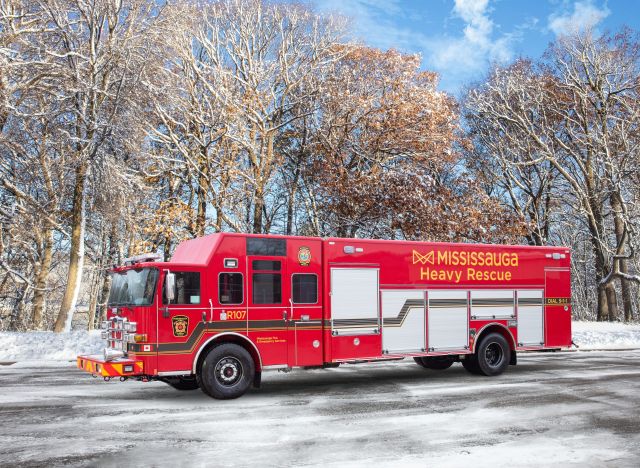
Mississauga (Jan 22) – Two new state-of-the art heavy rescue vehicles will help Mississauga Fire and Emergency Services (MFES) respond to challeging and complex emergency situation.
“These new heavy rescue vehicles represent a substantial investment in the safety and well-being of our community,” said Deryn Rizzi, Fire Chief and Director of Emergency Management. “They are integral to our mission of providing prompt and effective emergency response services, ensuring that our highly skilled firefighters have the necessary resources to handle complex and challenging situations efficiently.”
This purchase is a significant milestone for MFES as it marks the first time it has acquired heavy rescue vehicles of this calibre.
Heavy rescue vehicles are uniquely designed to carry specialized equipment used for complex emergency scenarios such as medical emergencies, structural fires, vehicle collisions, trench and confined space rescues as well as industrial, machine and elevator accidents.
In addition to firefighting gear, these heavy rescue vehicles are equipped with a variety of technical rescue equipment, including battery-powered hydraulic extrication tools, stabilizing struts for structural shoring and vehicle stabilization, rope rescue devices, machinery and elevator rescue tools, among many others.
The vehicles will be strategically deployed across Mississauga to maximize coverage and improve response times, further enhancing MFES’s ability to protect lives and property. These new vehicles will also provide support for emergencies such as structure fires, atmospheric testing, medical crises, and motor vehicle collisions.
The heavy rescue vehicles are a valuable addition to the MFES fleet, which will now consist of 17 Pumpers, eight Aerials, four Squads, two Heavy Rescues, one electric-powered Pumper (due to arrive in August 2024) and several other support vehicles including a Hazardous Response Vehicle, Air Rehab Unit, Command Post and three District Chief Command vehicles.
On average, MFES responds to 30,000 emergency calls annually, making it essential to have a robust fleet of emergency vehicles that can handle any situation at a moment’s notice.




